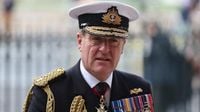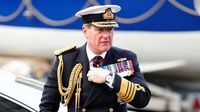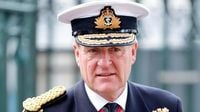The head of the Royal Navy, Admiral Sir Ben Key, has been suspended amid allegations of an extramarital affair with a female officer under his command. This unprecedented move marks the first time in the Navy's 500-year history that its chief has faced a misconduct investigation.
Sir Ben Key, 59, has led the Royal Navy since 2021 as First Sea Lord, having joined as a cadet in 1984. His suspension is particularly shocking given his reputation as a man of principles and morals, as noted by a top Navy source who expressed disbelief at the allegations. "It is shocking, really shocking because of who he is. Not just because he is First Sea Lord, but his reputation is a man of principles and morals. He is a popular First Sea Lord," the source stated.
According to reports, Admiral Key is suspected of violating the Navy's strict 'service test,' which prohibits relationships between commanders and their subordinates. This rule is designed to maintain professionalism and prevent conflicts of interest within the ranks. The Ministry of Defence (MoD) confirmed on May 8, 2025, that Admiral Key had stepped back from his duties due to private reasons, though the specifics of the investigation remain undisclosed.
Vice Admiral Sir Martin Connell, the Second Sea Lord, has taken over command of the Royal Navy during this period. The MoD has stated that an investigation is ongoing, and it would be inappropriate to comment further at this time. Sir Ben Key had already planned to retire this summer, but his abrupt departure comes just days before he was scheduled to speak at the First Sea Lord’s Sea Power Conference in London, which has now been canceled.
Sources close to the situation indicated that Admiral Key was prevented from resigning early due to the ongoing administrative action, a term used within the Navy to describe employment law processes. This means that the investigation is being conducted under strict guidelines, and any potential penalties could include a reduction in rank or dismissal. However, it is unlikely that he will face a court martial, as his alleged actions do not constitute a crime.
Admiral Key's career has been marked by significant achievements, including leading the evacuation of approximately 15,000 people from Kabul during the Taliban's takeover in August 2021, an operation known as Operation Pitting. His leadership during this crisis earned him a Bronze Star from the United States in 2006 for his assistance in Baghdad. Throughout his military career, he commanded several ships, including the minehunter HMS Sandown and the aircraft carrier HMS Illustrious.
Educated at Bromsgrove School and later graduating with a degree in physics from Royal Holloway, University of London, Admiral Key has been a prominent figure in the Royal Navy for over 40 years. His leadership style has been characterized by a commitment to integrity, a core value of the Navy. In previous statements, he has emphasized the importance of upholding the values and standards of the armed forces, declaring a zero-tolerance policy for unacceptable behaviors.
The allegations against him have sent shockwaves through the naval community, with many expressing disbelief at the claims. A Navy source remarked, "I wouldn’t have called him a swordsman or a sniffer. He wasn’t known as a player, and nothing stays secret in the Navy." This sentiment highlights the unexpected nature of the allegations, given Admiral Key's previously unblemished reputation.
General Sir Gwyn Jenkins, who commanded the Special Boat Service, is anticipated to be the frontrunner to succeed Admiral Key permanently. If appointed, Jenkins would be the first member of the amphibious troops to take on the role of First Sea Lord, marking a significant shift in the Navy's leadership.
As the investigation continues, many within the Navy are left to grapple with the implications of these allegations. The Navy has long prided itself on its values of integrity and professionalism, and the current situation poses a challenge to those principles. The outcome of the investigation will not only affect Admiral Key's career but may also have broader implications for the Navy's culture and standards moving forward.
In his role as First Sea Lord, Admiral Key was not only responsible for the operational effectiveness of the Navy but also served as a key figure in discussions about defense spending and military strategy, especially in light of increasing global tensions. His leadership was seen as vital, particularly as European nations are urged to bolster their defense capabilities in response to changing geopolitical landscapes.
As the Royal Navy navigates this challenging period, the focus will be on ensuring that the investigation is conducted fairly and thoroughly. The integrity of the Navy and its leadership is at stake, and the outcome of this situation will likely resonate throughout the ranks.
Admiral Sir Ben Key's sudden suspension has raised questions about the future of the Royal Navy and its leadership, with many looking to the Ministry of Defence for clarity and direction in the coming weeks. The investigation's findings will be crucial in determining not only Admiral Key's fate but also the Navy's commitment to upholding its core values in the face of adversity.




